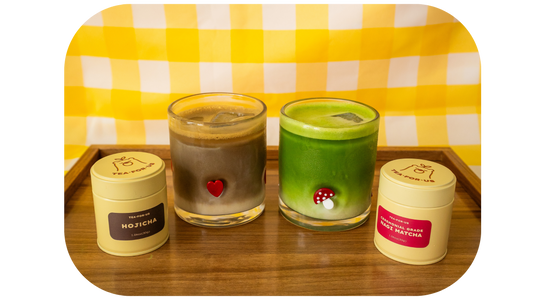
Matcha vs Coffee: Which One Helps You Focus Better?
The debate between Matcha and Coffee is a big deal for those seeking better focus and productivity. Both are key parts of many morning routines and are seen as great for the brain. Fans of each side argue over more than just taste and tradition. Let's look into how these drinks can be your top focus drink, highlighting their special qualities and perks.
Key Takeaways
- Matcha and Coffee are strong focus drinks with unique benefits.
- Coffee is known for its quick energy boost because of its high caffeine.
- Matcha gives steady energy and calm alertness thanks to L-Theanine.
- Comparing Matcha vs Coffee helps find the best coffee alternative for clear thinking.
- Looking into their health benefits can help pick the right drink for a productive day.
Introduction to Matcha and Coffee
Matcha is a vibrant green tea from Japan, known for its health benefits. It comes from the Tang Dynasty in China but became popular in Japan in the 12th century. Buddhist monks used it for meditation because it's calming yet keeps you alert.
Matcha is packed with antioxidants and boosts energy. Coffee, on the other hand, is loved worldwide for its caffeine kick. It originated in Ethiopia and is now a daily staple, known for its taste and ability to improve focus.

Both drinks are deeply rooted in culture, each with its own history and benefits. Whether you enjoy matcha's calm or coffee's energy, knowing their origins helps you choose better drinks. Here's a comparison of their key features:
| Aspect | Matcha | Coffee |
|---|---|---|
| Origins | Japanese Matcha Origins - 12th century Japan | Ethiopia |
| Form | Finely ground powder of green tea leaves | Ground coffee beans |
| Main Benefit | Matcha Energy Booster, high in antioxidants | Quick stimulation from caffeine |
| Cultural Significance | Used in traditional Japanese tea ceremonies | Pervasive in global coffee culture |
| Preparation | Whisked in hot water, creating a frothy beverage | Brewed through various methods (drip, espresso, etc.) |
Matcha vs Coffee: Nutrient Comparison
Knowing what's in Matcha and Coffee can help you choose better. Coffee is a classic morning pick-me-up. But Matcha is gaining fans for its health perks.

Calories and Macronutrients
Coffee has almost no calories. A cup has almost no carbs or proteins. It's great for those watching their calories.
Matcha, on the other hand, has a bit more. It's low in calories but rich in fiber and vitamins. Plus, it's packed with antioxidants. It's more than just a caffeinated drink; it's a mini-nutrition boost.
Caffeine Content
Coffee has a lot of caffeine, about 95 milligrams per cup. It gives you a quick energy boost. But, the energy drop can come soon after.
Matcha has less caffeine but it's released more slowly. This is thanks to L-Theanine, which helps caffeine last longer. It keeps you focused and alert without the crash.
Health Benefits of Coffee
Coffee is more than a tasty part of your morning routine coffee. It's known for its health perks, like antioxidants and helping with weight loss. It's a great coffee alternative for those trying to lose weight, thanks to its many benefits.
Antioxidant Properties
Coffee is full of antioxidants, which fight off harmful free radicals and inflammation. Drinking coffee regularly as a focus drink boosts your body's defenses. It's packed with chlorogenic acid and melanoidins, helping keep cells healthy and possibly reducing disease risk.
Weight Loss Benefits
Coffee helps with weight loss thanks to its caffeine. Caffeine speeds up metabolism and burns fat. It works by breaking down fat cells, helping with weight control. Adding coffee to your diet as a coffee alternative gives you energy and supports weight loss, making it a key part of many diets.
Matcha Health Benefits: A Focus Drink with Powerful Properties

Matcha, known as Ceremonial Grade Matcha, is a top choice for focus. It's packed with health benefits. This green tea has more antioxidants than regular green teas and coffees. It also has L-Theanine and caffeine, which help you stay alert without feeling jittery.
Let's explore why Matcha is great for keeping your mind sharp and focused.
Antioxidant Properties of Matcha
Matcha is full of antioxidants, like catechins. These fight off free radicals and protect cells. It has more antioxidants than regular green teas and coffees.
This makes Matcha a great choice for your health. It boosts your immune system and helps you age well.
L-Theanine: The Calm Alertness Agent
Matcha also has L-Theanine, an amino acid. It helps you feel calm and alert. This is different from the jitters you might get from too much caffeine.
L-Theanine and caffeine in Matcha improve your focus and mental clarity. Ceremonial Grade Matcha has a lot of L-Theanine. This makes it perfect for staying focused and mindful.
Main Pros and Cons of Each Drink
When looking at coffee and matcha, it's key to consider their good and bad sides. Both drinks have special qualities that meet different tastes and health needs.
Pros of Coffee
Coffee is loved for its energy boost and focus improvement. It's easy to find and comes in many flavors. Plus, it has antioxidants that fight off harmful body substances.
Cons of Coffee
But, coffee has downsides too. It can lead to addiction and mess with sleep. Too much caffeine can cause anxiety and stomach problems. It might also make it hard to fall asleep.
Pros of Matcha
Matcha gives a steady energy boost and sharpens the mind. It's a daily tea ritual that encourages tea mindfulness. It's packed with antioxidants and has L-Theanine for calm alertness, making it a great coffee substitute.
Cons of Matcha
Matcha's benefits are many, but it's pricier than coffee. There's a chance of pesticide or heavy metal contamination. Some might not like its taste, which could limit its use.
Conclusion
The debate between Matcha and Coffee comes down to what you like, your lifestyle, and your health goals. Coffee is known for its antioxidants and might help with weight loss. It's a favorite for those who want a strong, energizing drink.
Matcha, on the other hand, has its own set of benefits. It has antioxidants and L-Theanine, which helps you stay alert without feeling jittery. This makes it a great choice for those looking for a calm yet focused energy boost.
When deciding between Matcha and Coffee, think about what you need. Matcha is perfect for those who want to avoid caffeine highs. In the end, both Matcha and Coffee have their good points and bad points. The best choice depends on your personal taste and health goals. Pick the one that fits your lifestyle best.
FAQ
What is Matcha, and how is it different from regular green tea?
Matcha is a finely ground powder of green tea leaves from Japan. It's different from regular green tea because you drink the whole leaf. This gives you more nutrients and antioxidants.
How does the caffeine content of Matcha compare to Coffee?
Coffee has more caffeine than Matcha. But Matcha's caffeine is released slowly because of L-Theanine. This makes you feel calm and alert.
What are the antioxidant properties of Coffee?
Coffee is full of antioxidants. These help fight stress and inflammation. They're good for your health and well-being.
Can drinking Coffee aid in weight loss?
Yes, coffee's caffeine can boost your metabolism. This helps with fat loss and managing your weight.
What makes Matcha a superior focus drink?
Matcha's antioxidants and L-Theanine make it great for focus. It helps you stay alert and calm, without feeling jittery.
What are the benefits of L-Theanine in Matcha?
L-Theanine helps you feel alert but calm. It balances caffeine's effects, improving focus and relaxation without anxiety.
What are the main pros and cons of drinking Coffee?
Coffee's pros include its energy boost and wide availability. But, it can lead to dependency and disrupt sleep and mood.
What are the main pros and cons of drinking Matcha?
Matcha's pros include sustained energy and mental clarity. Its cons are its higher cost and the risk of contaminants.
Why might someone choose Matcha over Coffee?
People might prefer Matcha for its slow caffeine release and antioxidants. It also offers calm focus, making it better for mindfulness.
How does the nutrient composition of Matcha compare to Coffee?
Matcha has more antioxidants and fiber than coffee. Coffee, on the other hand, has fewer calories and more immediate caffeine.
What are the cultural origins of Matcha and Coffee?
Matcha comes from Japan, where it's part of tea ceremonies. Coffee originated in Ethiopia and is now a global morning staple.
Can both Matcha and Coffee be part of a healthy morning routine?
Yes, both can boost your morning. Matcha and coffee offer alertness and productivity. Your choice depends on your health goals and taste.

